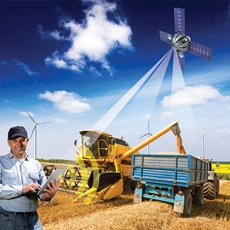Smart agriculture
23 Feb 2013
Integrating embedded systems into the IT infrastructure holds immense potential for the productive sectors of the economy. At the ''Embedded World 2013'' trade show in Nuremberg from 26 to 28 February, Fraunhofer researchers, using ''Smart Farming'' as an example, will demonstrate how the interaction of machines in cyber-physical systems operates safely and securely.
 |
| In the future, agricultural machines will be able to communicate with each other and will be controlled via smartphone or tablet. © Fraunhofer IESE |
Climate change, population growth and increasingly scarce resources are putting agriculture under pressure, for farmers to harvest as much as possible from the smallest possible land surface.
Until now, industry confronted this challenge with innovations in individual sectors - intelligent systems regulate engines in order to save on gas, for instance.
With the aid of satellites and sensor technology, farming equipment can automatically perform the field work; in doing so, seed, fertilizer and pesticides usage on the arable land can be managed efficiently.
Nonetheless, optimisation is gradually hitting its limits. The next step is to network these individual systems into cyber-physical production systems. They map the entire process electronically, from the farm computer to the harvesting operation. Thus, these systems can substantially increase efficiency and quality once again.
At the 2013 Embedded World trade show from 26 to 28 February in Nuremberg, specifically at the joint Fraunhofer booth 228 in Hall B5 – researchers from the Fraunhofer Institute for Experimental Software Engineering IESE in Kaiserslautern will demonstrate how agriculture will be able to benefit from networked systems in the future.


















